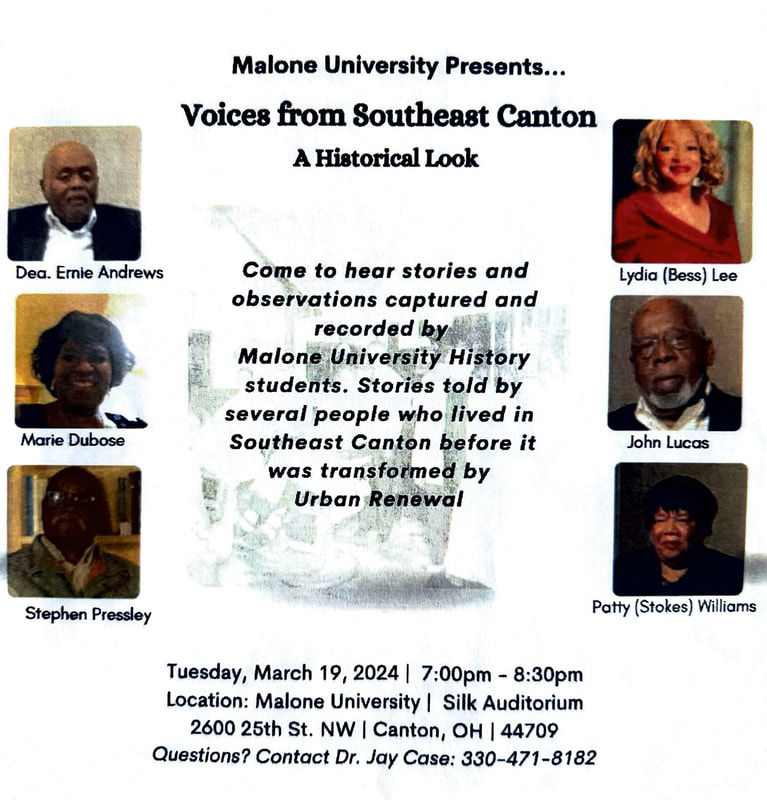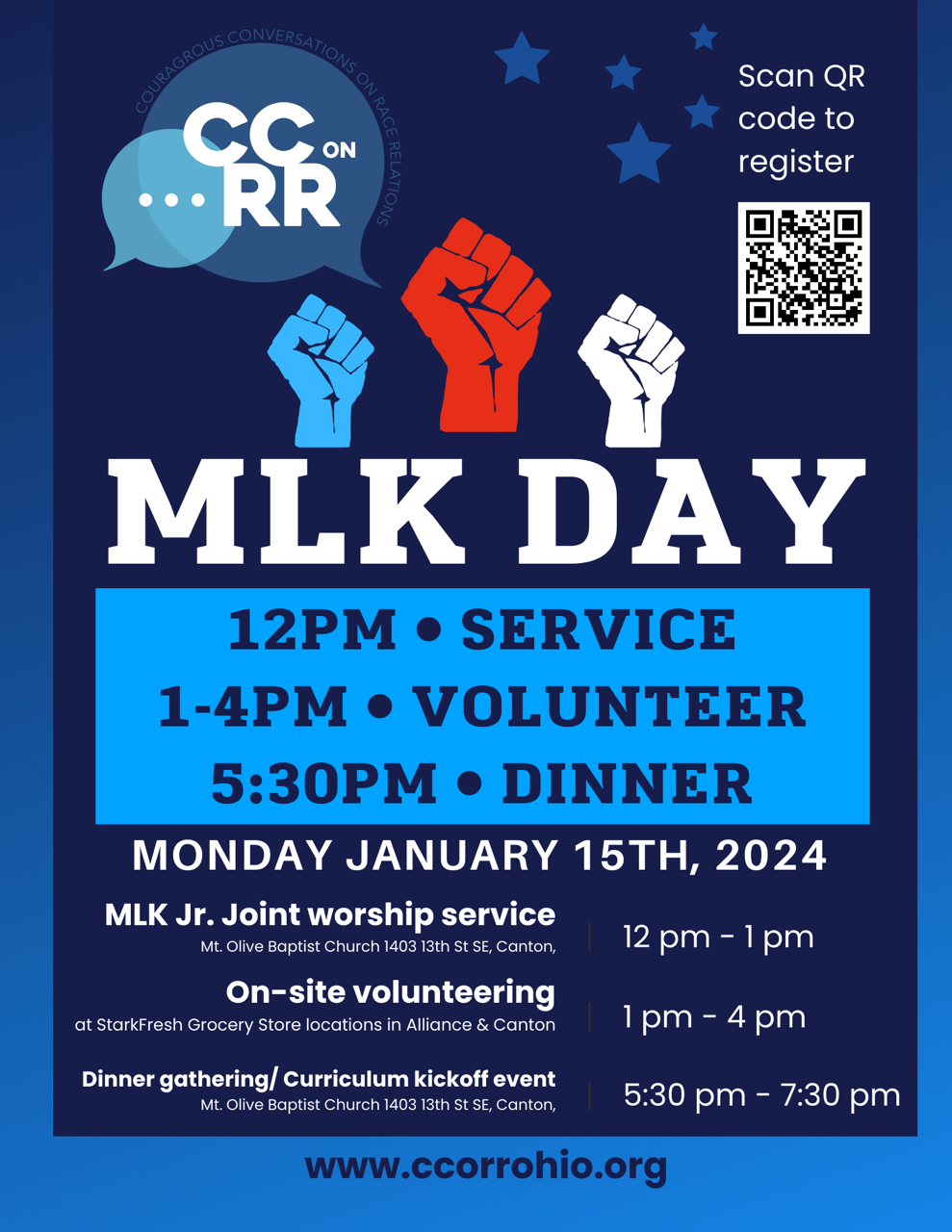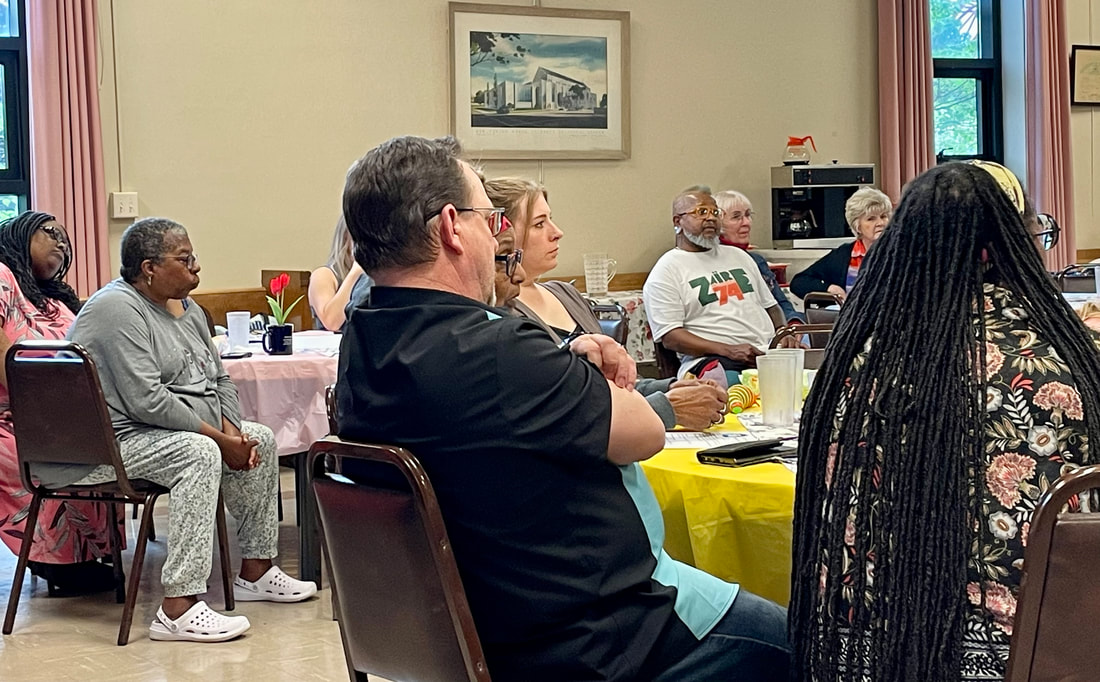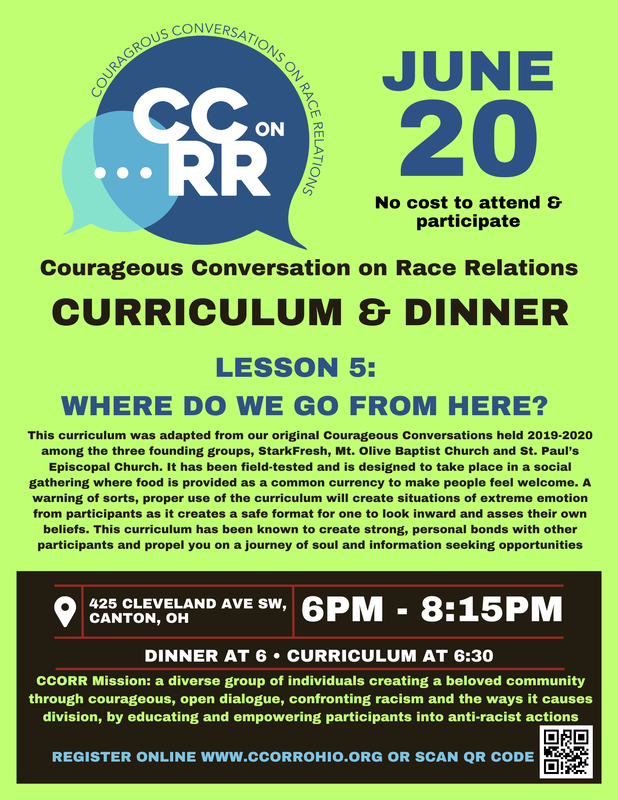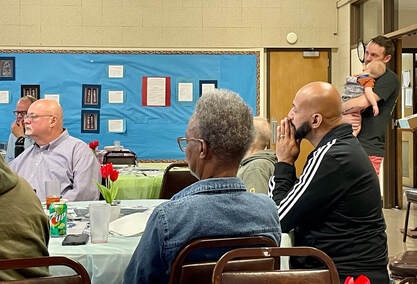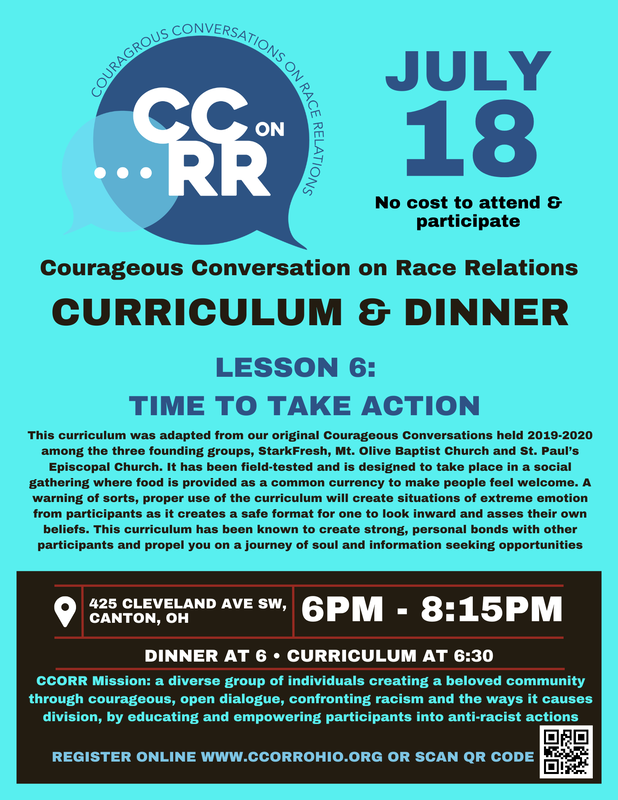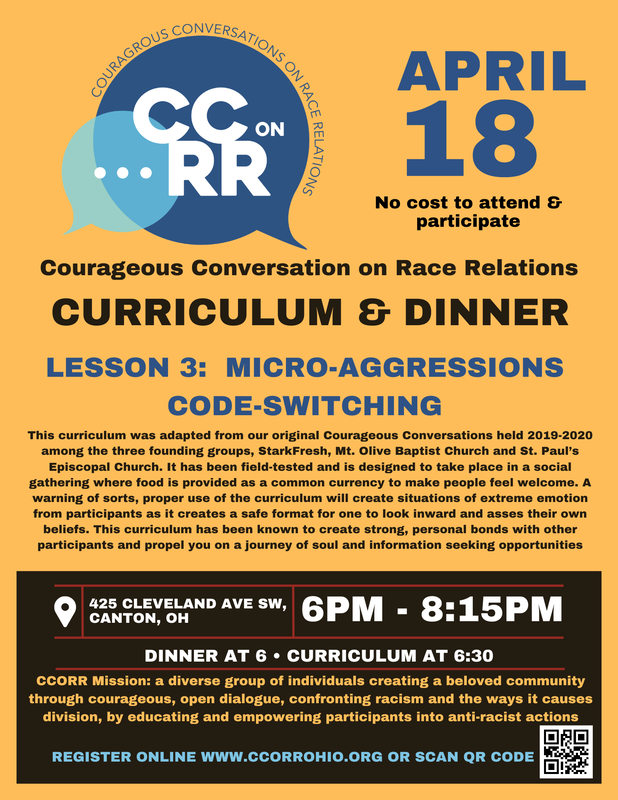The death of Frank Tyson gives new dimensions to
Courageous Conversation on White Privilege
Courageous Conversation on White Privilege
Our May 14 dinner and conversation focused on the systemic and life-experience privileges that that come with being white in our nation. It included exercises that revealed how the advantages are manifested and ways white people often benefit without even being aware of it.
But the most compelling part of the evening focused on the death Frank Tyson at the hands of Canton police. (see story below) Many of those gathered shared personal experiences they've had in interactions with police, rules they've learned to live by (including staying out of certain areas), and frustrations that sea-change promised after the death of George Floyd has not taken root the way many hoped.
Courageous Conversations on Race Relations is a collaborative of St. Paul's, Mt. Olive Missionary Baptist Church and StarkFresh. It meets on the second Tuesday of each month, beginning with dinner at 6 p.m., and the next will be on June 11. The gatherings are free, though everyone is invited to bring a covered dish.
But the most compelling part of the evening focused on the death Frank Tyson at the hands of Canton police. (see story below) Many of those gathered shared personal experiences they've had in interactions with police, rules they've learned to live by (including staying out of certain areas), and frustrations that sea-change promised after the death of George Floyd has not taken root the way many hoped.
Courageous Conversations on Race Relations is a collaborative of St. Paul's, Mt. Olive Missionary Baptist Church and StarkFresh. It meets on the second Tuesday of each month, beginning with dinner at 6 p.m., and the next will be on June 11. The gatherings are free, though everyone is invited to bring a covered dish.
Canton demands answers to questions surrounding the death in police custody of Frank Tyson

About 250 people gathered for more than two hours at a town hall May 1 at Mount Olive Missionary Baptist Church to talk about the death of Frank Tyson in Canton police custody and the state of community-police relations more broadly. Mount Olive is one of the partners with St. Paul's in Courageous Conversations.
Tyson, 53, died April 18 after being handcuffed and pinned to the floor of the Amvets club near where he had crashed into and sheered a utility pole in Southeast Canton. Police bodycam footage shows an agitated Tyson as police entered the club repeatedly accusing the officers of trying to kill him and telling those in the club to call the sheriff.
The video shows officers wrestled him to the ground and pressed on his upper back for about 30 seconds during which he complained at least seven times he could not breathe. The officers told him he was fine and, using an expletive, to shut up, then left him for five minutes after he stopped speaking before checking his pulse.
The questions at the Mount Olive town hall fell largely along three lines:
Did officers follow procedures to de-escalate a situation when they were called to the club, did they use proper procedures in subduing Tyson, and why did they take so long to check his pulse?
The officers are on paid leave while an investigation continues.
Tyson, 53, died April 18 after being handcuffed and pinned to the floor of the Amvets club near where he had crashed into and sheered a utility pole in Southeast Canton. Police bodycam footage shows an agitated Tyson as police entered the club repeatedly accusing the officers of trying to kill him and telling those in the club to call the sheriff.
The video shows officers wrestled him to the ground and pressed on his upper back for about 30 seconds during which he complained at least seven times he could not breathe. The officers told him he was fine and, using an expletive, to shut up, then left him for five minutes after he stopped speaking before checking his pulse.
The questions at the Mount Olive town hall fell largely along three lines:
Did officers follow procedures to de-escalate a situation when they were called to the club, did they use proper procedures in subduing Tyson, and why did they take so long to check his pulse?
The officers are on paid leave while an investigation continues.
What redlining did to Canton,
and why it's not just a sad story of the past
and why it's not just a sad story of the past

(Updated April 10) The effects of a federal policy dating back to the 1930s continues to be felt in Canton in everything from chronic health problems to crime to generational wealth gaps.
About three-dozen people gathered Tuesday night (April 9) at St. Paul's for dinner and discussions of redlining, a policy that steered investment towards what were regarded as desirable neighborhoods and away from lower income, working class and overwhelmingly minority neighborhoods.
The term comes from the literal red lines drawn on maps to advise banks where to put their money and what to avoid. In Canton, the red areas extended largely from the near southeast and northeast along an industrial corridor that later became a target for urban planners clearing out the southeast end.
Canton attorney Richie Harper outlined some of his deeper research into the long-term impact of redlining, sharing figures that show glaring gaps in environment, income and health.
Canton's so-called "A" (green) neighborhoods, for example, can boast tree-cover of nearly a third and land temperatures 1.9 degrees cooler than the city average. In the "D" (red) neighborhoods, the tree cover is less than half that, and the temperature is nearly a degree hotter than the city average. (Green space vs. asphalt also separates the A's and D's.)
The crime index in the green areas is less than a third what it is in red neighborhoods. And chronic health problems from asthma to heart disease continues to plague red areas.
Courageous Conversations is a collaboration of St. Paul's, Mt. Olive Missionary Baptist Church and StarkFresh, a Canton nonprofit. It meets the second Tuesday of each month at St. Paul's, beginning with dinner at 6 p.m. The next discussion on May 14 will explore what federally funded urban renewal projects did to Canton and how it still shapes the city. To register, go to ccorrohio.org. To find more on Harper's research, https://canton-community-equity-hub-stark.hub.arcgis.com/
About three-dozen people gathered Tuesday night (April 9) at St. Paul's for dinner and discussions of redlining, a policy that steered investment towards what were regarded as desirable neighborhoods and away from lower income, working class and overwhelmingly minority neighborhoods.
The term comes from the literal red lines drawn on maps to advise banks where to put their money and what to avoid. In Canton, the red areas extended largely from the near southeast and northeast along an industrial corridor that later became a target for urban planners clearing out the southeast end.
Canton attorney Richie Harper outlined some of his deeper research into the long-term impact of redlining, sharing figures that show glaring gaps in environment, income and health.
Canton's so-called "A" (green) neighborhoods, for example, can boast tree-cover of nearly a third and land temperatures 1.9 degrees cooler than the city average. In the "D" (red) neighborhoods, the tree cover is less than half that, and the temperature is nearly a degree hotter than the city average. (Green space vs. asphalt also separates the A's and D's.)
The crime index in the green areas is less than a third what it is in red neighborhoods. And chronic health problems from asthma to heart disease continues to plague red areas.
Courageous Conversations is a collaboration of St. Paul's, Mt. Olive Missionary Baptist Church and StarkFresh, a Canton nonprofit. It meets the second Tuesday of each month at St. Paul's, beginning with dinner at 6 p.m. The next discussion on May 14 will explore what federally funded urban renewal projects did to Canton and how it still shapes the city. To register, go to ccorrohio.org. To find more on Harper's research, https://canton-community-equity-hub-stark.hub.arcgis.com/
McKinley Presidential Library partners
to preserve Stark County's Black history
to preserve Stark County's Black history

FOR IMMEDIATE RELEASE
May 9, 2024
The McKinley Presidential Library & Museum, in partnership with the Committee to Preserve Stark County Black History, will host an Archive Day on May 18 from 10:00 to 1:00 PM at St. Paul’s AME Church in Canton. Please note, this event will NOT be held at the Museum. The church is located at 1800 E Tuscarawas St.
The Archive Day is being held to collect and preserve Stark County’s Black History in preparation for a new permanent gallery at the McKinley Presidential Library Museum. Participants will have the opportunity to share papers and photographs that document their story in Stark County with Mark Holland, Archivist at the McKinley Museum. Participants can also share the stories behind their family heirlooms and community treasures with Kait Bergert, Collections Manager at the McKinley Museum. Kait and Mark will photograph and scan the items while you wait and return them to you before you leave.
Videographer Mark Bigsbee will also be at the event to record oral histories. He will also make individual appointments for participants to provide an oral history at a later date.
Suggested archival items considered include, but are not limited to: letters, photographs, scrapbooks, diaries, yearbooks, and advertisements. Suggested objects include: textiles, glass, ceramics, silver, furniture, clothing and accessories, toys, tools and more.
About the Committee to Preserve Stark County Black History
The mission of the Committee to Preserve Stark County Black History is to establish a permanent exhibit, showcasing Stark County’s Black History, to be located inside the McKinley Presidential Library and Museum. The significant contributions of Black people in Stark County, individually and collectively, are compelling pieces of history that are largely missing from the mainstream narrative. We are only able to move forward when we know the full story of all the people who have created the community we call home. The McKinley Presidential Library and Museum and Stark County Historical Society are the perfect partners and venue for telling this story, so that all visitors might see themselves in the history and the future of Stark County. By bringing to light these pieces of history that have too long been in the shadows, we can inspire young people to make their own mark on history. You don’t have to become president or look like the people in the oil paintings to do legendary things worthy of veneration and admiration! Visit our website at www.starkcountyblackhistory.org/
About the Museum
The McKinley Presidential Library & Museum is located at 800 McKinley Monument Dr NW in Canton. The Keller Gallery is the Museum’s temporary exhibition space and features a variety of topics each year. The Museum also includes the McKinley National Memorial, McKinley Gallery, Street of Shops, The Stark County Story, Discover World, Ramsayer Research Center, and the Hoover-Price Planetarium. The Museum is open Tuesday – Saturday from 9:00 AM to 4:00 PM. The Museum is closed Sunday and Monday. Visit our website at www.McKinleyMuseum.org.
May 9, 2024
The McKinley Presidential Library & Museum, in partnership with the Committee to Preserve Stark County Black History, will host an Archive Day on May 18 from 10:00 to 1:00 PM at St. Paul’s AME Church in Canton. Please note, this event will NOT be held at the Museum. The church is located at 1800 E Tuscarawas St.
The Archive Day is being held to collect and preserve Stark County’s Black History in preparation for a new permanent gallery at the McKinley Presidential Library Museum. Participants will have the opportunity to share papers and photographs that document their story in Stark County with Mark Holland, Archivist at the McKinley Museum. Participants can also share the stories behind their family heirlooms and community treasures with Kait Bergert, Collections Manager at the McKinley Museum. Kait and Mark will photograph and scan the items while you wait and return them to you before you leave.
Videographer Mark Bigsbee will also be at the event to record oral histories. He will also make individual appointments for participants to provide an oral history at a later date.
Suggested archival items considered include, but are not limited to: letters, photographs, scrapbooks, diaries, yearbooks, and advertisements. Suggested objects include: textiles, glass, ceramics, silver, furniture, clothing and accessories, toys, tools and more.
About the Committee to Preserve Stark County Black History
The mission of the Committee to Preserve Stark County Black History is to establish a permanent exhibit, showcasing Stark County’s Black History, to be located inside the McKinley Presidential Library and Museum. The significant contributions of Black people in Stark County, individually and collectively, are compelling pieces of history that are largely missing from the mainstream narrative. We are only able to move forward when we know the full story of all the people who have created the community we call home. The McKinley Presidential Library and Museum and Stark County Historical Society are the perfect partners and venue for telling this story, so that all visitors might see themselves in the history and the future of Stark County. By bringing to light these pieces of history that have too long been in the shadows, we can inspire young people to make their own mark on history. You don’t have to become president or look like the people in the oil paintings to do legendary things worthy of veneration and admiration! Visit our website at www.starkcountyblackhistory.org/
About the Museum
The McKinley Presidential Library & Museum is located at 800 McKinley Monument Dr NW in Canton. The Keller Gallery is the Museum’s temporary exhibition space and features a variety of topics each year. The Museum also includes the McKinley National Memorial, McKinley Gallery, Street of Shops, The Stark County Story, Discover World, Ramsayer Research Center, and the Hoover-Price Planetarium. The Museum is open Tuesday – Saturday from 9:00 AM to 4:00 PM. The Museum is closed Sunday and Monday. Visit our website at www.McKinleyMuseum.org.
The lines that separated wealth in Canton for generations
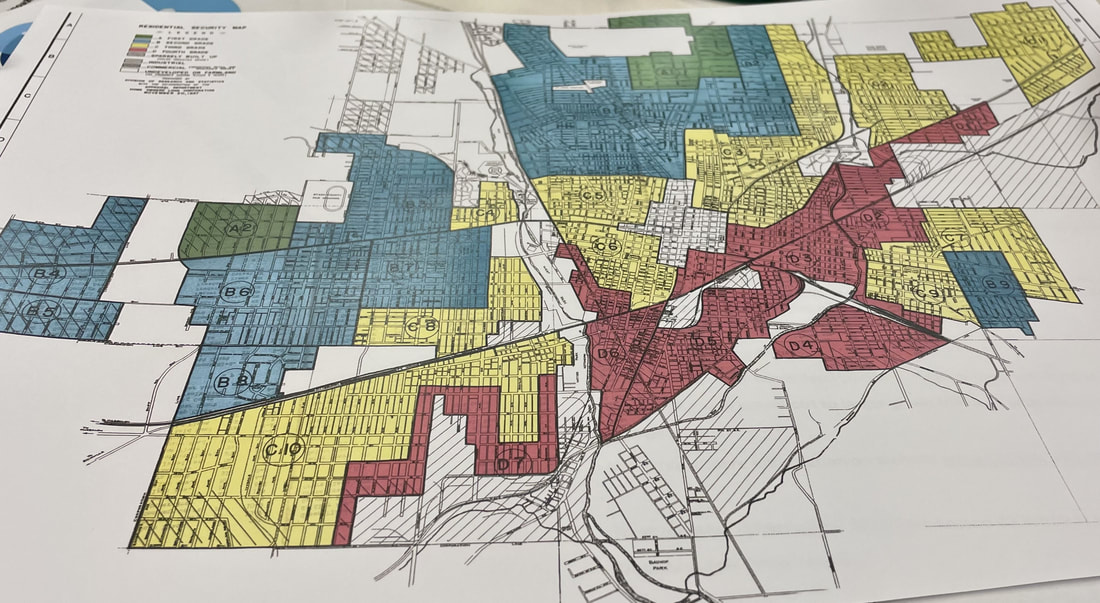
April's Courageous Conversation looked more closely at the lines on Canton maps used by real estate agents and the federal government to determine where mortgage loans would be made and where the federal government would insure them.
Urban renewal picks up where redlining left off
Madison Lathrop was the first project that promised economic progress, but the reality fell far short
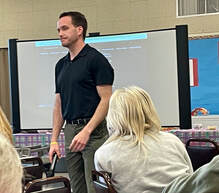
Richie Harper first began studying redlining, racial covenants and the failed promises of urban renewal as he was researching the root causes of crime for the Stark County prosecutor's office. He shared the results of his research with the roughly 50 people at Tuesday's (May 16) Courageous Conversations on Race Relations dinner and discussion.
Among those results were links to health and economic disparities that have stretched over generations. And he noted that much of that disparity began with a promise of a better Canton.
Harper's maps showed the Route 30 highway project tore through the thriving Black business district along Cherry Avenue SE, leaving only barren overpasses, open fields and a physically and racially segregated southeast end. But he noted that the first big urban renewal project was the clearing of 56-acres of neighborhoods that came to be called Madison-Lathrop. It was hyped as the key to renewed factory jobs and related economic development with the building of the White Engines plant. Much of the industrial property was occuplied only a few years.
Families in some cases had only a few weeks to move, and the project later came in for heavy criticism in a federal review of its impact on the community.
Harper's presentation was the fourth in the Courageous Conversations on Race Relations monthly discussions of the impact of historically racist decisions have had on the entire Canton community. The next, on June 20, will examine where we go from here.
For more on urban renewal and its impact on Canton, as well as the other Courageous Conversations topics, click on this link and go to the resources section of ccorrohio.org.
Among those results were links to health and economic disparities that have stretched over generations. And he noted that much of that disparity began with a promise of a better Canton.
Harper's maps showed the Route 30 highway project tore through the thriving Black business district along Cherry Avenue SE, leaving only barren overpasses, open fields and a physically and racially segregated southeast end. But he noted that the first big urban renewal project was the clearing of 56-acres of neighborhoods that came to be called Madison-Lathrop. It was hyped as the key to renewed factory jobs and related economic development with the building of the White Engines plant. Much of the industrial property was occuplied only a few years.
Families in some cases had only a few weeks to move, and the project later came in for heavy criticism in a federal review of its impact on the community.
Harper's presentation was the fourth in the Courageous Conversations on Race Relations monthly discussions of the impact of historically racist decisions have had on the entire Canton community. The next, on June 20, will examine where we go from here.
For more on urban renewal and its impact on Canton, as well as the other Courageous Conversations topics, click on this link and go to the resources section of ccorrohio.org.
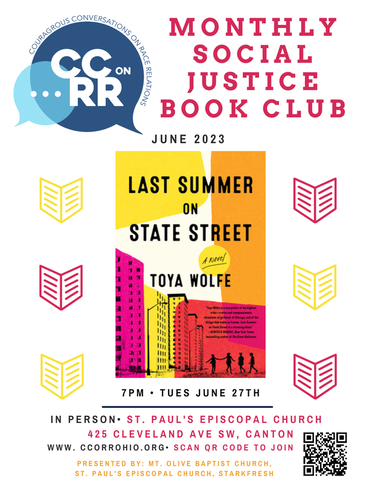
The Social Justice Book Groups meets this Tuesday (May 23) in the Guild Hall and via Zoom to talk about the book 'Poverty, by America,' which the New Yorker calls: "urgent and accessible ... it's moral force is a gut punch."
The next work is 'Last Summer on State Street,' the debut novel by Toya Wolfe.
The novel is set in the now-demolished Robert Taylor Homes, the projects where Wolfe was born and raised.
In an interview with New City, she described what some see as the miracle of growing up in the projects with a sense of joy, peace and love.
"If you’re going to be a storyteller you have to care about people. And FeFe (the main character) has a wide-reaching understanding of people. She wants to know what’s beyond State Street. She wants to know why Precious has that look on her face, she wants to understand what it’s like for Stacia to live in a house full of gangsters. She ponders and wonders and processes. I was a processor, too. And an observer. And curious. People who want to get out and tell the stories, they’ve been watching for a long time."
Stephen Curry called the novel "a vivid and honest coming-of-age story. It's about survival and faith going hand in hand."
Copies of the book are available for free at StarkFresh grocery store at 321 Cherry Ave. NE, Canton. The book group meets the fourth Tuesday of the month at 7 p.m. in the Guild Hall..”
The next work is 'Last Summer on State Street,' the debut novel by Toya Wolfe.
The novel is set in the now-demolished Robert Taylor Homes, the projects where Wolfe was born and raised.
In an interview with New City, she described what some see as the miracle of growing up in the projects with a sense of joy, peace and love.
"If you’re going to be a storyteller you have to care about people. And FeFe (the main character) has a wide-reaching understanding of people. She wants to know what’s beyond State Street. She wants to know why Precious has that look on her face, she wants to understand what it’s like for Stacia to live in a house full of gangsters. She ponders and wonders and processes. I was a processor, too. And an observer. And curious. People who want to get out and tell the stories, they’ve been watching for a long time."
Stephen Curry called the novel "a vivid and honest coming-of-age story. It's about survival and faith going hand in hand."
Copies of the book are available for free at StarkFresh grocery store at 321 Cherry Ave. NE, Canton. The book group meets the fourth Tuesday of the month at 7 p.m. in the Guild Hall..”
An epic love story and a disrupted American Dream

The next book for the Social Justice Book Group is "An American Marriage," and the next meeting is March 28, 2023.
The novel by Tayari Jones focuses on newlyweds Celestial and Roy, who embody the American Dream and the New South. He's a young executive, and she is an artist on the brink of an exciting career. But as they settle into the routine of their life together, they are ripped apart by circumstances neither could have imagined.
"An American Marriage" was a notable book selection by the New York Times, Washington Post and NPR, and an Oprah Book Club selection.
Books and are now available to pick up at StarkFresh at 321 Cherry Ave. NE.
Meetings are the 4th Tuesday at 7 p.m. You can join us in the Guild Hall or via Zoom.
Please call the Church Office for more information on books and Zoom login, 330-455-0286.
The novel by Tayari Jones focuses on newlyweds Celestial and Roy, who embody the American Dream and the New South. He's a young executive, and she is an artist on the brink of an exciting career. But as they settle into the routine of their life together, they are ripped apart by circumstances neither could have imagined.
"An American Marriage" was a notable book selection by the New York Times, Washington Post and NPR, and an Oprah Book Club selection.
Books and are now available to pick up at StarkFresh at 321 Cherry Ave. NE.
Meetings are the 4th Tuesday at 7 p.m. You can join us in the Guild Hall or via Zoom.
Please call the Church Office for more information on books and Zoom login, 330-455-0286.

